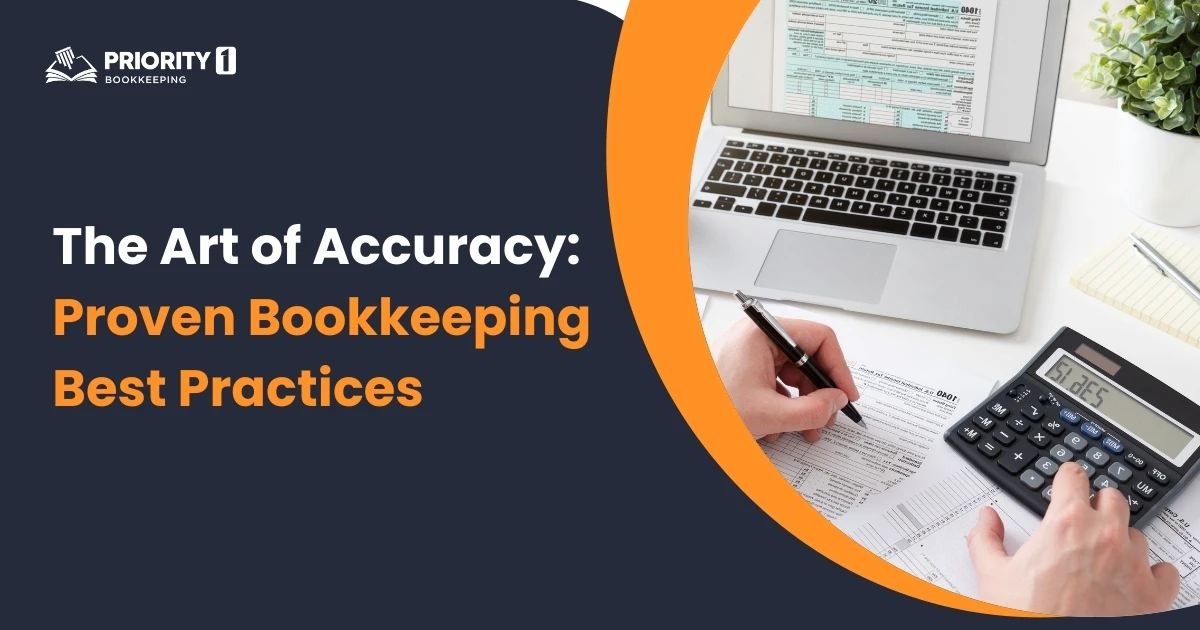
In today’s fast-paced business world, accuracy in bookkeeping isn’t just an advantage — it’s a necessity. Whether you’re running a small business, managing a healthcare practice, or operating as an NDIS provider, maintaining precise and compliant financial records is crucial for long-term success. Bookkeeping errors not only distort the financial health of your business but also lead to compliance risks, misinformed decisions, and cash flow issues.
This comprehensive guide explores the most effective bookkeeping best practices, practical tools to improve accuracy, common pitfalls to avoid, and how different industries — including healthcare and NDIS — can benefit from tailored bookkeeping strategies.
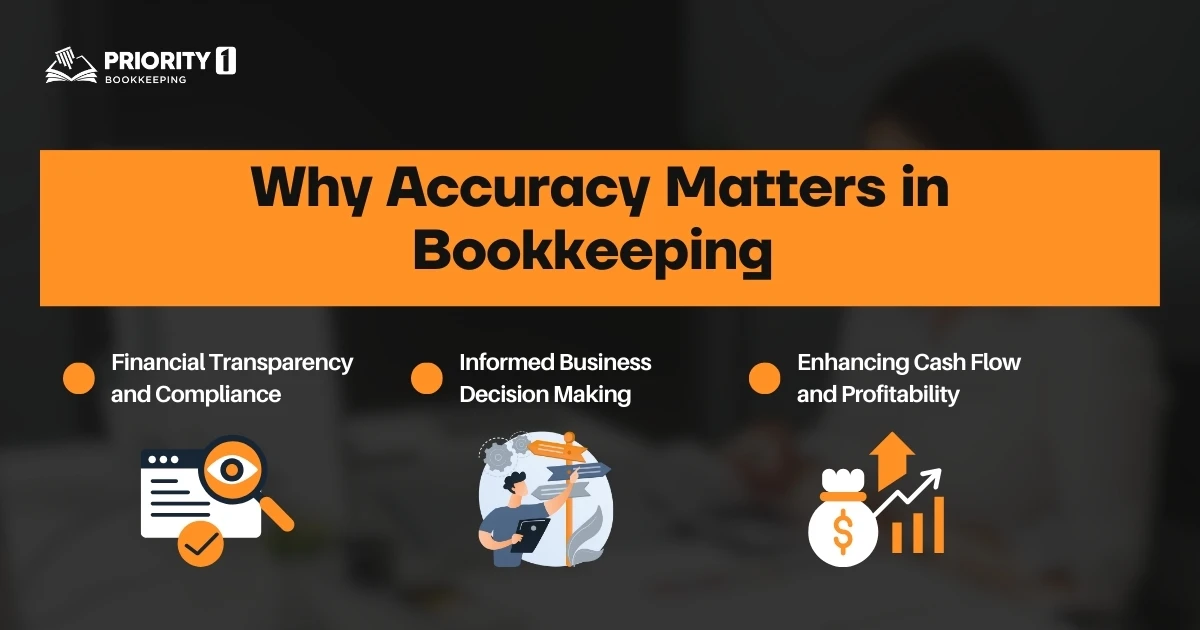
Accurate bookkeeping ensures your financial statements reflect the true performance and position of your business. This transparency is vital for maintaining compliance with Australian Taxation Office (ATO) regulations and preparing accurate BAS (Business Activity Statements). Failure to record income, expenses, or liabilities correctly can result in audits, fines, or even legal consequences.
From hiring staff to launching a new product or service, every major business decision hinges on reliable data. Accurate books allow you to track income, monitor expenses, and analyse trends over time. Clear records help you identify what’s working and what needs improvement — giving you the confidence to scale strategically.
One of the biggest benefits of accurate bookkeeping is better cash flow management. It enables you to stay on top of pending invoices, monitor bill payments, and ensure timely payroll. When your books are in order, it’s easier to avoid overdrafts, make investments, and forecast profitability with confidence.
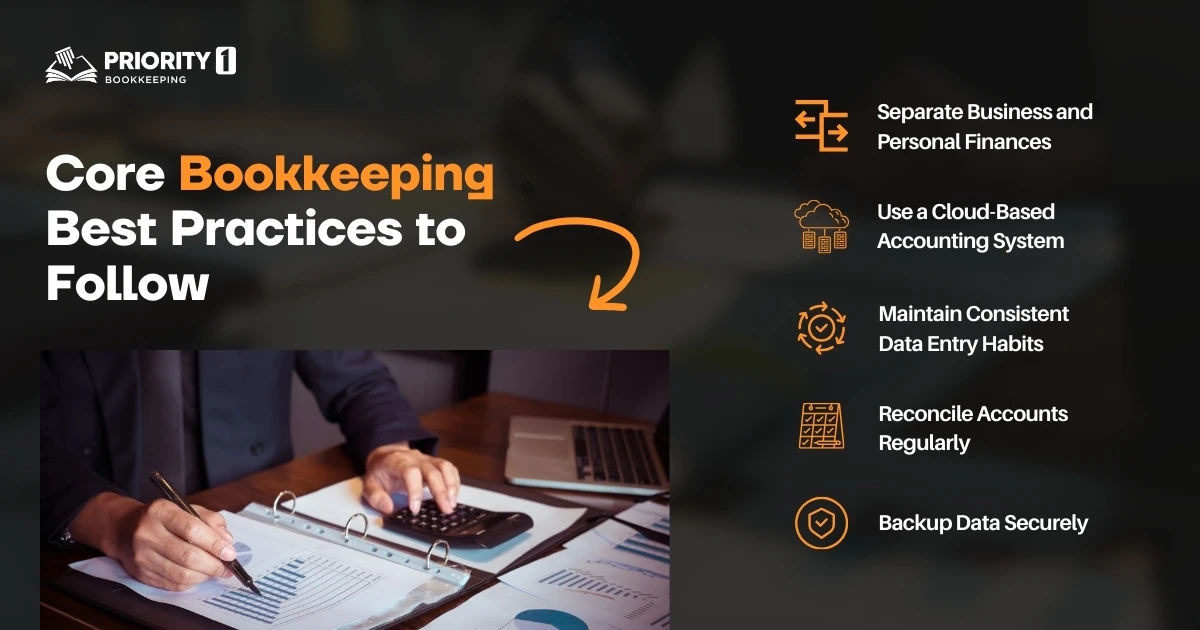
It may seem convenient to use one account for all your transactions, but this can create unnecessary complications. Always maintain a dedicated business bank account and credit card. This distinction simplifies reporting, ensures better tracking of business expenses, and safeguards personal assets.
Digital tools like Xero, MYOB, and QuickBooks Online offer intuitive interfaces, automation, and real-time reporting. A cloud-based accounting system enhances collaboration with bookkeepers or accountants, reduces manual errors, and provides easy access to financial data from anywhere — especially useful for remote teams.
Set a routine for recording transactions. Whether it’s daily or weekly, consistency reduces the risk of forgetting or misclassifying entries. Automate data capture where possible — many platforms offer OCR (Optical Character Recognition) to scan and upload receipts.
Reconciliation ensures your bank statements match your accounting records. Ideally, this should be done monthly. It helps detect unauthorised transactions, missed entries, or duplication, keeping your financials clean and audit-ready.
Loss of financial data can be disastrous. Use secure cloud services with automatic backups, and for added protection, store periodic offline backups on encrypted external drives. This ensures you’re covered in case of system failures or cyber threats.
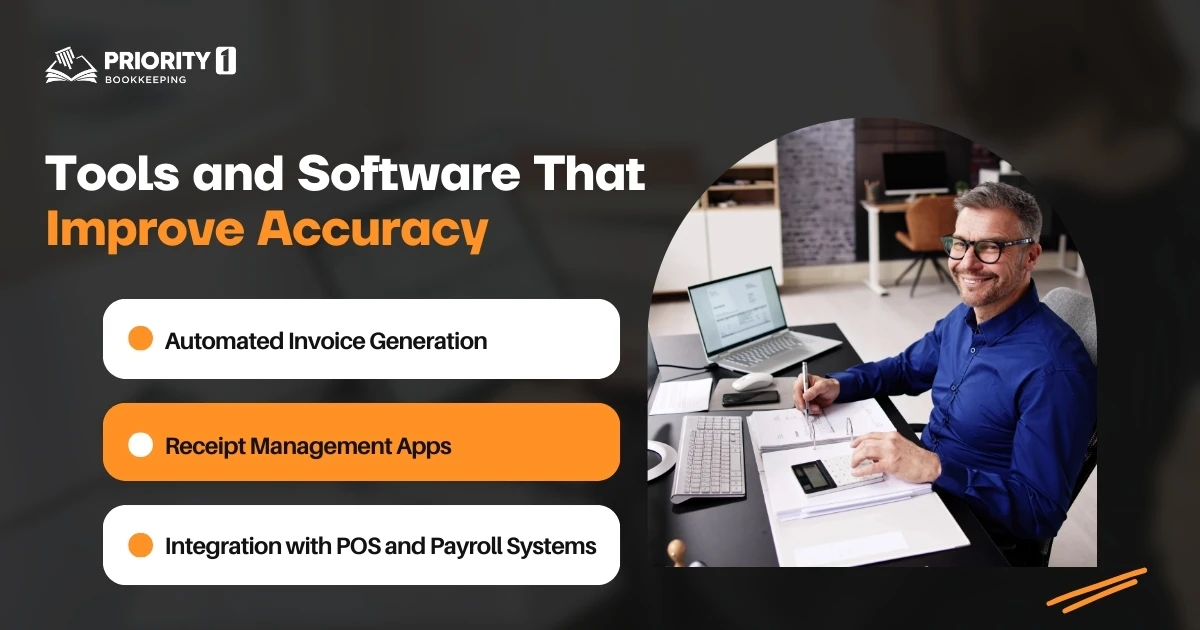
Manually issuing invoices increases the likelihood of human error, such as incorrect GST or client details. Automated invoicing tools ensure accuracy, consistency, and faster processing — all of which are key to maintaining cash flow.
Apps like Dext, Hubdoc, and Shoeboxed make it easy to digitise and categorise receipts. These tools sync with your accounting software and eliminate the need for manual data entry, preserving accuracy and saving time.
Whether you’re a retailer using Square or a healthcare clinic using a rostering system like Deputy, integration ensures seamless data flow. This reduces duplication of efforts and prevents errors from transferring data between systems.
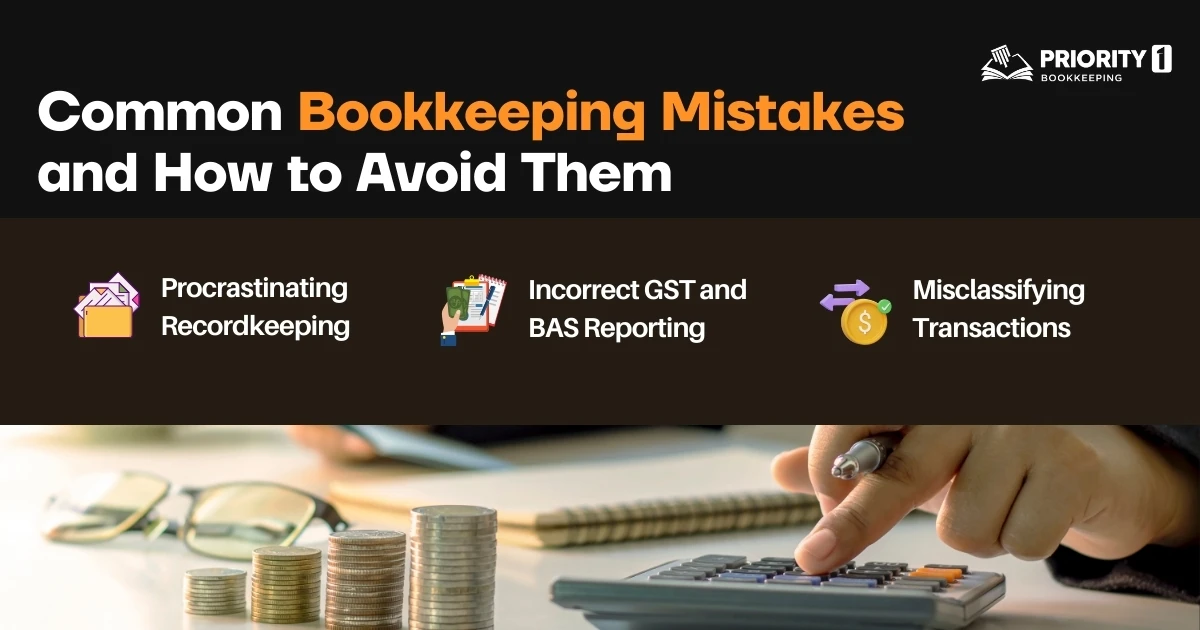
Waiting until the end of the quarter or year to sort through receipts and bank statements is risky. Delays often lead to missed transactions, errors, or tax-deductible expenses falling through the cracks. Avoid this by scheduling regular bookkeeping sessions or setting up automation.
Many small businesses struggle with categorising GST correctly. Incorrect coding of expenses or sales can distort your BAS and attract scrutiny from the ATO. A professional review of your coding practices can help avoid costly mistakes.
Confusing an expense for a capital purchase or vice versa can impact profit reporting and depreciation schedules. Always cross-check entries and consult with a professional if you’re unsure. Proper classification ensures that your reports remain meaningful and tax compliant.
NDIS bookkeeping requires special attention due to unique funding models, NDIA audits, and service-level reporting. Meticulous recordkeeping of participant invoices, travel logs, and support services is essential. Timely and correct documentation also supports claims and ensures compliance with the NDIA guidelines.
Healthcare businesses must navigate complex billing systems, including Medicare, private health, and out-of-pocket payments. Bookkeeping must capture all income sources and expenses such as staff salaries, medical supplies, and rent. Payroll systems should accommodate irregular rosters and contract staff.
Accurate inventory management is crucial. Bookkeepers must reconcile stock levels, track cost of goods sold (COGS), and manage refunds or returns. Integration with platforms like Shopify or WooCommerce simplifies this process and ensures synchronised data across sales, inventory, and finance.
Many businesses, especially growing SMEs and service providers, choose to outsource bookkeeping to reduce internal workload and ensure professional accuracy. Outsourcing offers access to skilled professionals who are up-to-date with compliance regulations, knowledgeable in modern accounting software, and efficient in handling large volumes of transactions — all without the overheads of hiring in-house staff.
When outsourcing, it’s important to find a provider who:
This is where Priority1 Bookkeeping stands out. We go beyond just data entry — we become your financial partner. With extensive experience in handling industry-specific bookkeeping requirements, we help you stay compliant, audit-ready, and in control. Whether you’re an NDIS provider needing funding accuracy or a small business managing cash flow, our team ensures nothing slips through the cracks.
Small businesses often grapple with time-consuming financial administration, complex compliance requirements, and the challenge of maintaining accurate financial records. Choosing to outsource bookkeepers not only minimizes the risk of financial errors and ensures regulatory compliance, but also frees up valuable time, allowing you to focus on core business operations, customer service, and strategic growth.
At Priority1 Bookkeeping, we specialise in bookkeeping services tailored for small businesses. Our dedicated team understands the unique financial challenges and opportunities faced by small business owners. From accurate transaction processing and reconciliations to insightful financial reporting, we support businesses with timely, detailed, and compliant bookkeeping services designed to meet regulatory requirements and support informed decision-making.
Conducting monthly reviews ensures that accounts are up to date, and anomalies are flagged early. Year-end reviews support accurate tax filings and financial planning. Use checklists to audit categories, vendor balances, and reconciliation reports.
Stay current with changes in tax regulations, software updates, and best practices. Enroll staff in bookkeeping workshops or webinars. Encourage internal upskilling to reduce reliance on external help and strengthen internal control.
Accurate bookkeeping isn’t just a compliance requirement — it’s a strategic advantage. When your books are correct, your business decisions are sharper, your finances more stable, and your risk much lower. Whether you’re a small business owner, an NDIS provider, or part of a healthcare organisation, adopting these bookkeeping best practices ensures long-term growth, efficiency, and peace of mind.
At Priority1 Bookkeeping, we understand the importance of accuracy, reliability, and personalised support. As specialists in Australian industries including NDIS, healthcare, retail, and professional services, we help our clients maintain spotless records, streamline operations, and focus on what they do best — running their business.
If you’re looking to gain more control over your finances, reduce the burden of back-end tasks, and stay compliant with confidence, it’s time to partner with professionals who know the industry inside and out.
Stay updated with expert bookkeeping tips and insights! Subscribe now to receive updates directly in your inbox for your business.
* We never spam your email
38B Douglas Street, Milton QLD, 4064 Australia
Monday - Friday 09:30 AM - 05:30 PM
© 2025 All Rights Reserved.